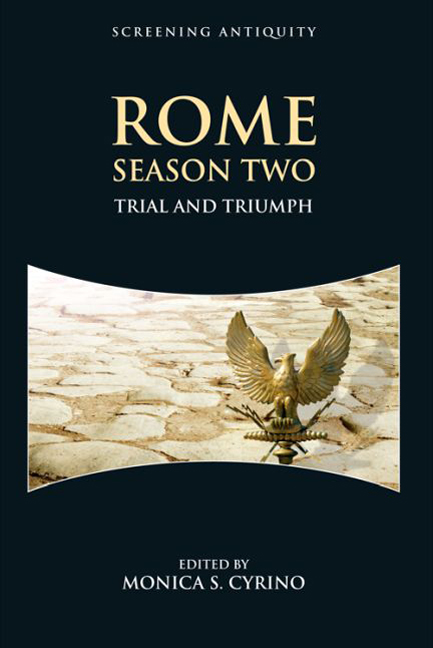Introduction: The Trials and Triumphs of Rome, Season Two
Published online by Cambridge University Press: 07 October 2017
Summary
The plan was simple: the second season of HBO–BBC's Rome, scheduled to premiere in January of 2007, was going to build on the huge popular success of the critically acclaimed first season, weaving together “real” Roman historical events and people with compelling fictional subplots and characters into another set of powerful, pleasurable episodes. Critics were conspicuously excited by the narrative and dramatic prospects of the new season, with its combination of “sex, violence, and fancy book learnin’ – everybody wins.” Lisa Schwarzbaum of Entertainment Weekly declared: “Everything … is still reliably rotten, wantonly carnal, and spectacularly costumed as HBO and the BBC resume their dramatic collaboration on the world's largest standing film set at Italy's Cinecittà Studios.” Tad Friend of The New Yorker praised the series’ continued focus on character-driven storylines, especially its female protagonists: “Rome, in its new season … showcases its brusquest and most soldierly characters: its highborn women. The show's pitiless gorgons campaign ceaselessly to have their men crowned or killed, whichever.” And Gary Kamiya of Salon.com confessed he was “addicted” to the way the series shocked the past back to life and startled him out of his comfortable nest of modernity: “Rome is based on solid historical research. But what makes it draw imaginative blood is the fact that it's uncensored scholarship, audacious history. Rome is incredibly entertaining, while also being incredibly shocking. It's history porn.”
All this breathless anticipation was clearly due to the sensational achievement of the series’ first season, which aired in the autumn of 2005. The first season of Rome chronicled the trajectory of Julius Caesar's later career, as it followed the events that took place between Caesar's return to Rome after his conquest of Gaul in 52 bc and his assassination by senatorial conspirators in 44 bc. As the series begins, Caesar is planning to return to Rome after eight years of warfare to seek his political fortune, and the first season brilliantly narrates his conflict with Pompey, his dalliance with Cleopatra, and his ultimate betrayal by Brutus. The second season, which would open dramatically with Caesar dead on the Senate floor, was to chart the beginnings of the violent power struggle between Antony, Caesar's most trusted general and ally, and Octavian, his great-nephew and legal heir.
- Type
- Chapter
- Information
- Rome Season TwoTrial and Triumph, pp. 1 - 10Publisher: Edinburgh University PressPrint publication year: 2015



